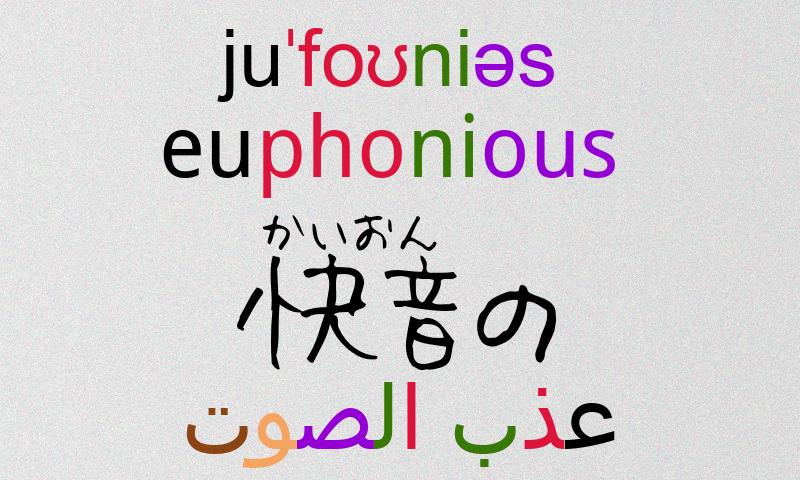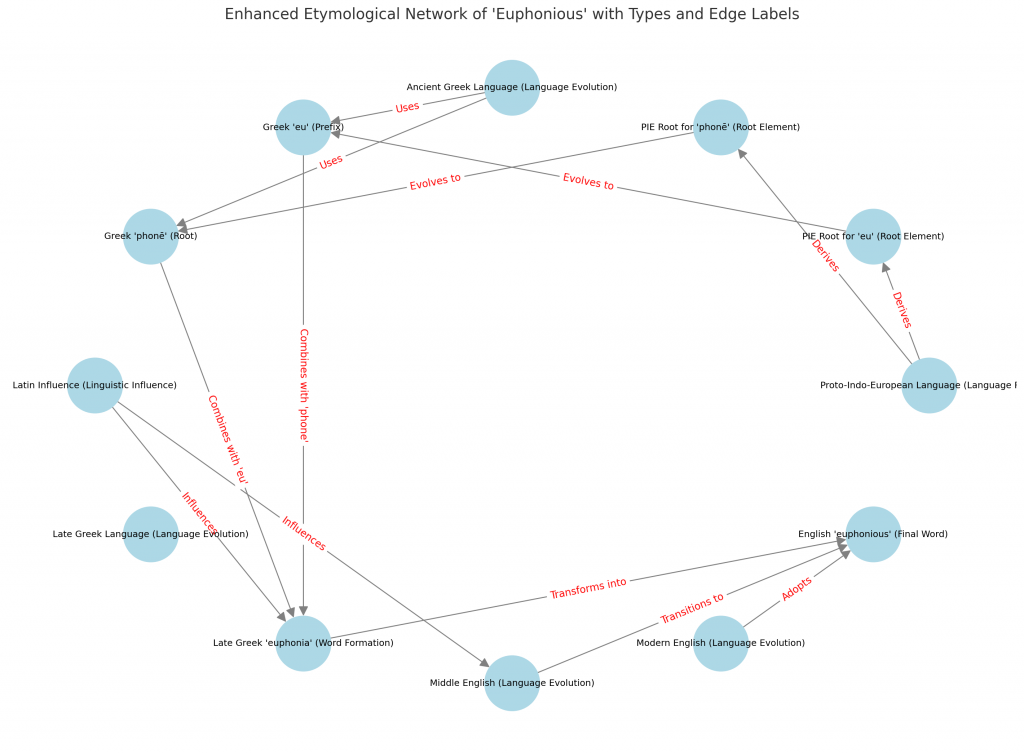
In the realm of words, “euphonious” embarks on a fascinating journey, tracing its roots back to the ancient corridors of linguistic history.
{
"word":"euphonious",
"syllable_word":"eu·pho·ni·ous",
"phonetic":"juˈfoʊ·ni·əs",
"japanese_synonym":"快音(かいおん)の",
"kanji":"快音",
"kanji_synonym":"悦耳",
"chinese_synonym":"悅耳",
"simplified_chinese_synonym":"悦耳",
"arabic_synonym":"عذب الصوت",
"french_synonym":"euphonique"
}Table of Contents
From Proto-Indo-European Echoes to Greek Sophistication

Our tale begins in the distant past with the Proto-Indo-European (PIE) language, the grand ancestor of many tongues. In this linguistic cradle, two embryonic elements emerged: the precursors to “eu” and “phonē.” These PIE roots were like raw clay, waiting to be shaped by the hands of time and culture.
As centuries passed, these elements drifted with the tides of human migration, eventually anchoring in Ancient Greece. Here, the root “eu,” signifying “good” or “well,” and “phonē,” denoting “sound” or “voice,” found a new home. The Greeks, renowned for their love of art and rhetoric, embraced these elements, embedding them into the fabric of their language and culture.
The Melodic Confluence in Late Greek
As the Greek language evolved, a harmonious confluence occurred. The prefix “eu” and the root “phonē” intertwined, giving birth to “euphonia” — a term that resonated with the quality of pleasing sound, a concept cherished in Greek music and oratory.
Through the Latin Lens and Beyond
The influence of Latin, another linguistic titan of the ancient world, cannot be overlooked. As Latin spread its wings across Europe, it brushed against the Greek “euphonia,” leaving imprints that would later find their way into the evolving English language.
The journey of “euphonia” took a decisive turn during the Middle English period. Here, amidst the tumult of linguistic transformation, “euphonia” began to morph, adapting to the sounds and sensibilities of a changing world.
The Culmination in Modern English
Finally, in the embrace of Modern English, “euphonia” transformed into “euphonious.” It was no longer just a Greek or Latin term but a word fully integrated into the English lexicon, carrying the legacy of its melodious past. “Euphonious” now stood for sounds that are pleasing to the ear, a testament to its journey through languages and cultures.
In Conclusion
The story of “euphonious” is not just about linguistic evolution; it’s a tapestry woven from the threads of human history, culture, and the unending quest for expression. From the ancient PIE roots to the modern English word, “euphonious” mirrors the dynamic, ever-changing nature of language itself, echoing the human desire to encapsulate beauty in sound and meaning.
{
"nodes": [
{"id": "pie", "label": "Proto-Indo-European Language", "type": "Language Root"},
{"id": "pie_eu", "label": "PIE Root for 'eu'", "type": "Root Element"},
{"id": "pie_phone", "label": "PIE Root for 'phonē'", "type": "Root Element"},
{"id": "ancient_greek", "label": "Ancient Greek Language", "type": "Language Evolution"},
{"id": "eu", "label": "Greek 'eu'", "type": "Prefix"},
{"id": "phone", "label": "Greek 'phonē'", "type": "Root"},
{"id": "latin_influence", "label": "Latin Influence", "type": "Linguistic Influence"},
{"id": "late_greek", "label": "Late Greek Language", "type": "Language Evolution"},
{"id": "euphonia", "label": "Late Greek 'euphonia'", "type": "Word Formation"},
{"id": "middle_english", "label": "Middle English", "type": "Language Evolution"},
{"id": "modern_english", "label": "Modern English", "type": "Language Evolution"},
{"id": "euphonious", "label": "English 'euphonious'", "type": "Final Word"}
],
"edges": [
{"source": "pie", "target": "pie_eu", "label": "Derives", "type": "Derivation"},
{"source": "pie", "target": "pie_phone", "label": "Derives", "type": "Derivation"},
{"source": "pie_eu", "target": "eu", "label": "Evolves to", "type": "Evolution"},
{"source": "pie_phone", "target": "phone", "label": "Evolves to", "type": "Evolution"},
{"source": "ancient_greek", "target": "eu", "label": "Uses", "type": "Usage"},
{"source": "ancient_greek", "target": "phone", "label": "Uses", "type": "Usage"},
{"source": "eu", "target": "euphonia", "label": "Combines with 'phone'", "type": "Combination"},
{"source": "phone", "target": "euphonia", "label": "Combines with 'eu'", "type": "Combination"},
{"source": "latin_influence", "target": "euphonia", "label": "Influences", "type": "Influence"},
{"source": "latin_influence", "target": "middle_english", "label": "Influences", "type": "Influence"},
{"source": "euphonia", "target": "euphonious", "label": "Transforms into", "type": "Transformation"},
{"source": "middle_english", "target": "euphonious", "label": "Transitions to", "type": "Transition"},
{"source": "modern_english", "target": "euphonious", "label": "Adopts", "type": "Adoption"}
]
}